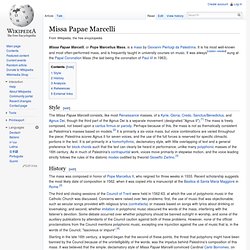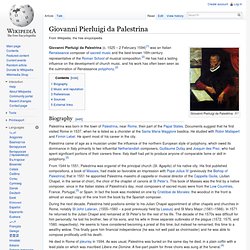

Missa Papae Marcelli. Style[edit] History[edit] The mass was composed in honor of Pope Marcellus II, who reigned for three weeks in 1555.

Recent scholarship suggests the most likely date of composition is 1562, when it was copied into a manuscript at the Basilica di Santa Maria Maggiore in Rome.[2] Credo from Missa Papae Marcelli. 'Kyrie': Missa Papae Marcelli * Palestrina / Tallis Scholars 1980. Giovanni Pierluigi da Palestrina. Giovanni Pierluigi da Palestrina Giovanni Pierluigi da Palestrina (c. 1525 – 2 February 1594)[1] was an Italian Renaissance composer of sacred music and the best-known 16th-century representative of the Roman School of musical composition.[2] He has had a lasting influence on the development of church music, and his work has often been seen as the culmination of Renaissance polyphony.[2] Biography[edit]

Palestrina - Gloria. 'Sanctus' & 'Benedictus': Missa Papae Marcelli * Palestrina / Tallis Scholars 1980. Missa Papae Marcelli Agnus I - Palestrina. Missa Papae Marcelli Agnus II - Palestrina.